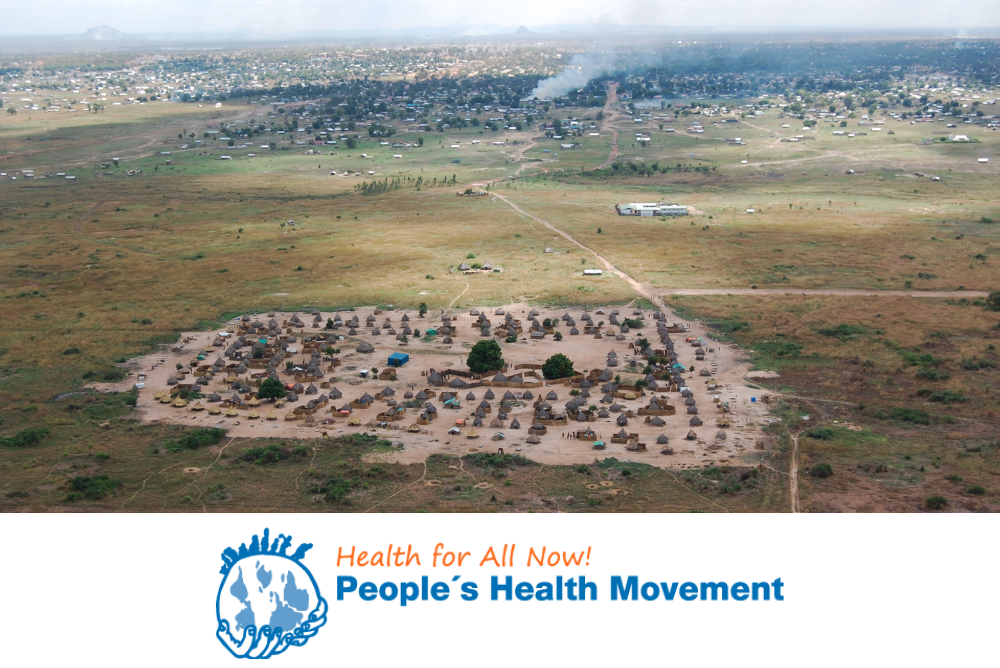In solidarity with the people of Sudan
The People's Health Movement stands in solidarity with the people of Sudan, suffering from a conflict that has been raging since 2023. Amidst violence and forced displacement, the people of Sudan are facing a supply crisis that has millions of victims on the brink of a food insecurity crisis.
The Sudanese conflict, which began on April 15, 2023, following a power struggle between the Sudanese Armed Forces (SAF) and the Rapid Support Forces (RSF), has persisted for nearly 16 months, causing widespread despair and triggering a severe humanitarian crisis.
While much of the fighting has centered on Khartoum, the capital city, the conflict's impact has extended to other regions of Sudan. In Darfur, disturbing reports have emerged of mass killings, forced displacement, and allegations of ethnic cleansing attributed to the ongoing conflict. Civilians across Sudan have borne the brunt of this crisis, with alarming reports of opposing factions showing little regard for civilian safety and infrastructure.
The conflict in Sudan has unleashed devastating consequences, including widespread displacement, loss of life, and severe food insecurity. Internally, 7.7 million Sudanese people have been forced from their homes, while an additional 2 million have sought refuge in neighboring countries such as the Central African Republic, Chad, Egypt, Ethiopia, Libya, South Sudan, and Uganda (UNHCR, June 2024). The displacement crisis has not only uprooted communities but also subjected them to dangerous journeys in search of safety.
This crisis has resulted in approximately 15,000 deaths and triggered a humanitarian emergency, leaving an estimated 25 million people (half of the country's population) urgently requiring assistance. The impact on food security is dire, affecting 18 million individuals, or about 37% of the population, who require immediate food aid to survive (IRC, April 2024). Particularly vulnerable are children, with an estimated 14 million in critical need of life-saving support. Among them, 7.4 million lack access to safe drinking water, increasing the risk of waterborne diseases, while 2 million have not received essential vaccinations, leaving them susceptible to preventable illnesses.
Making matters worse, many safe areas in the northern states, where people fleeing conflict zones have been displaced, have been exposed to torrential rains and floods that have washed away entire villages and displaced thousands of citizens to open fields and mountainous and elevated areas, making them vulnerable to disease and stings from scorpions and snake bites.
Moreover, systemic issues such as racism have exacerbated human rights challenges in Sudan, creating a persistent and complex situation that demands attention and resolution. Reports indicate ongoing violations of human rights and humanitarian law, including disregard for civilian lives, sporadic civilian killings, looting, and the use of sexual and gender-based violence as weapons of war. The warring parties in Darfur have been implicated in war crimes, stripping them of popular legitimacy.
Attacks on health personnel and facilities have continued to be a feature of violations of International Humanitarian Law in this conflict, the latest of which was the shelling of the Omdurman Midwives Hospital, one of the oldest obstetrics and gynecology hospitals serving a large number of women in the area, only 24 hours after it was restored and returned to operation thanks to the efforts of popular initiatives and movements after being out of service for more than a year.
The ongoing conflict has thus compounded into a multifaceted humanitarian crisis, straining resources and endangering the lives and futures of millions in Sudan and beyond. Now, more than ever, urgent action is needed to de-escalate tensions and rally international solidarity with Sudan. It is crucial to address the acute humanitarian needs swiftly and ensure that emergency response and aid reach all segments of the population, particularly the most vulnerable. Immediate efforts are essential to alleviate suffering, restore stability, and pave the way for sustainable recovery in Sudan.
We call on the warring factions to cease hostilities against the civilian population, de-escalate the conflict, ensure humanitarian access, as well as facilitate humanitarian corridors for medical missions and emergency humanitarian care.
We call upon the international community, human rights, health rights and civil society organizations to call for an immediate and lasting ceasefire and to double efforts for the much needed humanitarian assistance.


